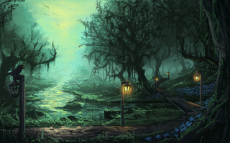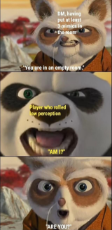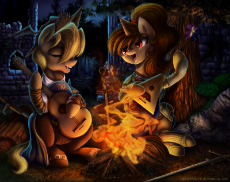In the south in the Kululu Forest, Posey searches for a lost instrument of war. In Baltimare, Kira establishes herself, while Silver enjoys a brief respite. In Hellquill, Amber prepares to play her music to the dictator of Hellquill. Elsewhere, trouble brews.
/vx/ - Videogames and Paranormal
1357 replies and 90 files omitted.
>>174119
>Pony holler
Best guess is some kind of monkey, though it could indeed be a pony. It's far away enough to not be an immediate concern
>running water
It does move somewhat, though not much.
>Posey is getting wet for the second time today...
Oh my...
Posey feels something rub against her back before getting in the water. She knows it's the cool touch of one of the ghosts.
"Rust? Why care about that? The paint protects it anyways."
Going into the water, the gun seems to be more or less intact. The steel or aluminum barge it was on has sunk.
[Read more] >Pony holler
Best guess is some kind of monkey, though it could indeed be a pony. It's far away enough to not be an immediate concern
>running water
It does move somewhat, though not much.
>Posey is getting wet for the second time today...
Oh my...
Posey feels something rub against her back before getting in the water. She knows it's the cool touch of one of the ghosts.
"Rust? Why care about that? The paint protects it anyways."
Going into the water, the gun seems to be more or less intact. The steel or aluminum barge it was on has sunk.
>>174122
>the gun seems to be more or less intact.
>The paint protects it
"Well, that's good news." Posey replies
Posey takes her wrench and attempts to remove the part she's looking for, before dragging it out of the water for inspection.
"And I thought cadaver-collection was demeaning work..." she thinks to herself
>the gun seems to be more or less intact.
>The paint protects it
"Well, that's good news." Posey replies
Posey takes her wrench and attempts to remove the part she's looking for, before dragging it out of the water for inspection.
"And I thought cadaver-collection was demeaning work..." she thinks to herself
>>174124
Posey checks it there's anything dangerous/interesting on the barge as well.
Posey checks it there's anything dangerous/interesting on the barge as well.
>>174120
Khoi tilts her head, while Jubilosa comes closer
"Acquainted... What do you mean?"
Jubilosa asks,
"So... about these eggs..."
>>174121
If Kira is looking for one to sleep in, unfortunately they don't have that
A slate-grey stallion with a black mane and yellow eyes walks closer, then stands maybe 15 feet away from Kira.
"Do you need something?"
[Read more] Khoi tilts her head, while Jubilosa comes closer
"Acquainted... What do you mean?"
Jubilosa asks,
"So... about these eggs..."
>>174121
If Kira is looking for one to sleep in, unfortunately they don't have that
A slate-grey stallion with a black mane and yellow eyes walks closer, then stands maybe 15 feet away from Kira.
"Do you need something?"
>>174126
Kira looks at this very stormy-looking stallion who stands so far away, and smiles at him.
"Hello! We're just finding items to purchase. We've already got a bed in mind, now I'm just looking for a good chest to store my belongings in."
Kira looks at this very stormy-looking stallion who stands so far away, and smiles at him.
"Hello! We're just finding items to purchase. We've already got a bed in mind, now I'm just looking for a good chest to store my belongings in."
>>174126
"You know, get to know each other, before friends, et cetera."
Silver nods at Jubilosa, and gets the carton of eggs and some butter. "How many and how do you want them cooked?"
"You know, get to know each other, before friends, et cetera."
Silver nods at Jubilosa, and gets the carton of eggs and some butter. "How many and how do you want them cooked?"
>>174129
Silver nods, setting the butter to melt in a skillet as he cracks a couple eggs into a bowl and uses either a whisk or a fork (depending on what's available) to scramble them up. He then cooks up the scrambled eggs in the skillet to her liking.
Silver nods, setting the butter to melt in a skillet as he cracks a couple eggs into a bowl and uses either a whisk or a fork (depending on what's available) to scramble them up. He then cooks up the scrambled eggs in the skillet to her liking.
>>174129
"Hmmmmm..." Kira considers the options available to her, then points to the biggest one. "I like this big one."
"Hmmmmm..." Kira considers the options available to her, then points to the biggest one. "I like this big one."
>>174132
Silver looks over at Khoi, and tilts his head.
"My intent? I cannot just open my home and hearth to those in need because it is right thing to do?"
Silver looks over at Khoi, and tilts his head.
"My intent? I cannot just open my home and hearth to those in need because it is right thing to do?"
>>174132
"Well, I suppose I need storage for whatever I come upon. I don't have much now, just my bow, arrows, and spear among other miscellaneous items. But, you never know what you could come to own in the future, and I'd like to be able to have a place to securely store them."
"Well, I suppose I need storage for whatever I come upon. I don't have much now, just my bow, arrows, and spear among other miscellaneous items. But, you never know what you could come to own in the future, and I'd like to be able to have a place to securely store them."
Sorry for not replying in so long. I meant to get to this much sooner but finding appropriate music wasn't easy.
>>173684
Amber does not keep a head of state waiting, especially one of such tastes. She turns to Erik. "We will be playing Bartók's duos next. First Ara Táskor into Számláló, then Scherzo into Arab Dal, Szunyogtánc, Gyermekrengetéskor into Szénagyüjtéskor and Lakodalmas, and finally Bánkódás. Got it?"
Erik isn't given much time to get ready, or even to process the strange names, before bow is put to string. The first part starts slowly but coldly, before launching into an atonal melody, before receding again. This goes on several times, and it is a surprise that this was a transliteration of a harvest song, though to an untrained ear it may evoke waves of fields of grain. But in reality, it is the harsh bitterness of repetitive years of work which wear on a farmer who is never able to escape his drudgery. This is followed by a quicker and mounting melody, the lead part of which is filled very aptly with Amber's deeper-sounding viol. As the short section carries on, the disparate notes of the viol and Erik's violin come closer together but never fully merge before an abrupt end. Some deep fissures in being, like that between griffons or ponies, or the conflict of wills within the madness of Diazela, will never be healed before sudden ruination.
[YouTube] Béla Bartók - 44 Duos for Two Violins, Sz. 98![]()
Unlike in her previous performance, Amber is not hampered by a lack of instruments and is fully within her element in the string duos. The next section starts out with a lively song in unison before the two instruments divide in organized chaos, complete with plucks. What could be more suited for the plans of griffons rended asunder by the terrible entropic beauty of the universe? The two start playing a darkly whirling dance from distant deserts, each instrument complementing the other in an otherworldly, heartless sound. Unknown to the listeners even the notes to it are beautifully symmetric.
(39:47)
The tempo picks up one more time as Amber and Eric play what seem to be the same song at different places yet which mesh together in rhythm and come together twice in a climax. Aptly named the Mosquito Dance, it resembles a horde of pests moving faster than the eye can perceive, uncatchable and yet waiting to descend.
(19:16)
The duo slow down and more closely match their music, though they remain separate enough to lend an ethereal atonal quality to the song. Why this piece is titled "Cradle Song" remains a mystery, with the most likely explanation being that it is an adaptation of an existing lullaby. Rather than being calming, however, it is haunting and sets one's feathers on end. This is assuaged by the next song, the "Hay Song," which among the collection is the most genuinely peaceful and pastoral piece. Given the name, it is most likely taken from some remote pony province, with the atonal yet tranquil melody suiting their unique optimism and harmony even in times of chaos. The leitmotifs carry on through the "Wedding Song," which unlike previous slow sections carries a warmth in it suiting the name, even as it drags to a halt.
(8:01)
Capping out the performance is a morose and tearful song. At times it seems like two separate songs of mourning played together. It retains ethereal qualities yet feels grounded in the agonies and sorrows of life. Is it the plaintive cries of two separated lovers, or evocative of a coming conflict that will shake the world to its core? At one point the song seems to end, but comes back with full volume, as one's sorrows may recede and return. The song slows once more and the two musicians drag out the last note as their performance finally comes to a close.
(23:07)
>>173755
Middles?
>>174072
[YouTube] Mostly Vegans![]()
[Read more] >>173684
Amber does not keep a head of state waiting, especially one of such tastes. She turns to Erik. "We will be playing Bartók's duos next. First Ara Táskor into Számláló, then Scherzo into Arab Dal, Szunyogtánc, Gyermekrengetéskor into Szénagyüjtéskor and Lakodalmas, and finally Bánkódás. Got it?"
Erik isn't given much time to get ready, or even to process the strange names, before bow is put to string. The first part starts slowly but coldly, before launching into an atonal melody, before receding again. This goes on several times, and it is a surprise that this was a transliteration of a harvest song, though to an untrained ear it may evoke waves of fields of grain. But in reality, it is the harsh bitterness of repetitive years of work which wear on a farmer who is never able to escape his drudgery. This is followed by a quicker and mounting melody, the lead part of which is filled very aptly with Amber's deeper-sounding viol. As the short section carries on, the disparate notes of the viol and Erik's violin come closer together but never fully merge before an abrupt end. Some deep fissures in being, like that between griffons or ponies, or the conflict of wills within the madness of Diazela, will never be healed before sudden ruination.
[YouTube] Béla Bartók - 44 Duos for Two Violins, Sz. 98
Unlike in her previous performance, Amber is not hampered by a lack of instruments and is fully within her element in the string duos. The next section starts out with a lively song in unison before the two instruments divide in organized chaos, complete with plucks. What could be more suited for the plans of griffons rended asunder by the terrible entropic beauty of the universe? The two start playing a darkly whirling dance from distant deserts, each instrument complementing the other in an otherworldly, heartless sound. Unknown to the listeners even the notes to it are beautifully symmetric.
(39:47)
The tempo picks up one more time as Amber and Eric play what seem to be the same song at different places yet which mesh together in rhythm and come together twice in a climax. Aptly named the Mosquito Dance, it resembles a horde of pests moving faster than the eye can perceive, uncatchable and yet waiting to descend.
(19:16)
The duo slow down and more closely match their music, though they remain separate enough to lend an ethereal atonal quality to the song. Why this piece is titled "Cradle Song" remains a mystery, with the most likely explanation being that it is an adaptation of an existing lullaby. Rather than being calming, however, it is haunting and sets one's feathers on end. This is assuaged by the next song, the "Hay Song," which among the collection is the most genuinely peaceful and pastoral piece. Given the name, it is most likely taken from some remote pony province, with the atonal yet tranquil melody suiting their unique optimism and harmony even in times of chaos. The leitmotifs carry on through the "Wedding Song," which unlike previous slow sections carries a warmth in it suiting the name, even as it drags to a halt.
(8:01)
Capping out the performance is a morose and tearful song. At times it seems like two separate songs of mourning played together. It retains ethereal qualities yet feels grounded in the agonies and sorrows of life. Is it the plaintive cries of two separated lovers, or evocative of a coming conflict that will shake the world to its core? At one point the song seems to end, but comes back with full volume, as one's sorrows may recede and return. The song slows once more and the two musicians drag out the last note as their performance finally comes to a close.
(23:07)
>>173755
Middles?
>>174072
[YouTube] Mostly Vegans
>>174139
"Well, either way, the biggest you have should do me fine!"
She smiles, and flicks her tongue.
"Well, either way, the biggest you have should do me fine!"
She smiles, and flicks her tongue.
>>174133
>>174147
Soon(TM). As you’ve surely guessed, it’s not 100% smooth. But this whole questline will be over soon.
>>174141
Jubilosa takes up some kind of conversation in the bar area with Clipping, with the word “jam” being heard.
Khoi:
“But they are children. Should they not be with some family?”
>>174142
“Uh… ‘there’s one this way.” He moves to love past Kira. Kira, however, takes up a decent portion of the walk way between furniture, and stretches even further. Either out of fear or politesse, he seems reluctant to move past Kira, and may have to step over her body at some point. He lifts up a foreleg.
“Uh, this way.”
[Read more] >>174147
Soon(TM). As you’ve surely guessed, it’s not 100% smooth. But this whole questline will be over soon.
>>174141
Jubilosa takes up some kind of conversation in the bar area with Clipping, with the word “jam” being heard.
Khoi:
“But they are children. Should they not be with some family?”
>>174142
“Uh… ‘there’s one this way.” He moves to love past Kira. Kira, however, takes up a decent portion of the walk way between furniture, and stretches even further. Either out of fear or politesse, he seems reluctant to move past Kira, and may have to step over her body at some point. He lifts up a foreleg.
“Uh, this way.”
>>174167
It sounds like Clip and Jubilosa are having an engrossing conversation. Hopefully Silver gets to listen to more of it, if it's not finished before his current one with Khoi.
"You do not think this could become family?" Silver says, as he gestures over the gathered creatures.
It sounds like Clip and Jubilosa are having an engrossing conversation. Hopefully Silver gets to listen to more of it, if it's not finished before his current one with Khoi.
"You do not think this could become family?" Silver says, as he gestures over the gathered creatures.
>>174167
"Oh, my apologies sir! I'm still getting used to these pony-sized spaces."
She kindly pulls her tail closer to her coiling it around herself as tightly as she can, making enough room for the reluctant pony to pass by and consequently removing one more excuse of not get closer to the nope noodle.
"Oh, my apologies sir! I'm still getting used to these pony-sized spaces."
She kindly pulls her tail closer to her coiling it around herself as tightly as she can, making enough room for the reluctant pony to pass by and consequently removing one more excuse of not get closer to the nope noodle.
>>174170
Kira smiles friendly enough at the sales associate pony, though she also has to admit it's starting to get a little awkward.
Kira smiles friendly enough at the sales associate pony, though she also has to admit it's starting to get a little awkward.
>>174172
“Well, they do, but… this is an older colt, a griffin… a gnoll…” she looks down
>>174173
The stallion decides to finally move by. While the passage way isn’t that small, Kira is rather wide when coiled. He looks over to her and scoots by. He smiles with all teeth showing, as he must surely be aware he is well within hugging range. His fur on his legs rubs Kira’s scales, and he utters a “sorry.” He moves past Kira, and looks back to her, still smiling with teeth. “This way… please.”
“Well, they do, but… this is an older colt, a griffin… a gnoll…” she looks down
>>174173
The stallion decides to finally move by. While the passage way isn’t that small, Kira is rather wide when coiled. He looks over to her and scoots by. He smiles with all teeth showing, as he must surely be aware he is well within hugging range. His fur on his legs rubs Kira’s scales, and he utters a “sorry.” He moves past Kira, and looks back to her, still smiling with teeth. “This way… please.”
>>174174
Thankfully, for the poor pony's sanity, Kira does not hug the pony (at least, for the moment). She smiles back at him and starts to follow, uncoiling as she does so like a spool of yarn.
Thankfully, for the poor pony's sanity, Kira does not hug the pony (at least, for the moment). She smiles back at him and starts to follow, uncoiling as she does so like a spool of yarn.
>>174174
Silver chuckles, and smiles at the kirin regardless if she can see it or not.
"There have been far stranger families, I must say."
Silver chuckles, and smiles at the kirin regardless if she can see it or not.
"There have been far stranger families, I must say."
>>174175
He moves ahead, often looking back
“This way.”
They do not move far at all. He stops in front of a very large rectangular chest of white with blue floral decorations, mimicking the decorative style of oriental porcelain vases. It’s big enough for Kira to fit her bow in, her blankets, and basically all of her possessions with room to spare. But while it’s big enough to fit a pony and maybe even Kira, it is not long enough for pole arms.
“Wood construction. There is a lock on it, but for full security you may want to add your own, which you can with the bars here.” He looks back to her. “This is our largest.”
He moves ahead, often looking back
“This way.”
They do not move far at all. He stops in front of a very large rectangular chest of white with blue floral decorations, mimicking the decorative style of oriental porcelain vases. It’s big enough for Kira to fit her bow in, her blankets, and basically all of her possessions with room to spare. But while it’s big enough to fit a pony and maybe even Kira, it is not long enough for pole arms.
“Wood construction. There is a lock on it, but for full security you may want to add your own, which you can with the bars here.” He looks back to her. “This is our largest.”
>>174176
She sits on her hind quarters, and moves herself up in a way that she can use her forehooves to make gestures. “But…” she looks down, and her tail curls around her front, with the little tuft of hair in front of her left hind leg. “I wanted a family that was mine.” She moves her hooves in circles around each other in front of her. “My blood and my stallion…”
She sits on her hind quarters, and moves herself up in a way that she can use her forehooves to make gestures. “But…” she looks down, and her tail curls around her front, with the little tuft of hair in front of her left hind leg. “I wanted a family that was mine.” She moves her hooves in circles around each other in front of her. “My blood and my stallion…”
>>174178
"Well..." Silver puts a hoof on her circling forehooves, stopping them. "...why can that not still happen?"
"Well..." Silver puts a hoof on her circling forehooves, stopping them. "...why can that not still happen?"
>>174177
Kira lets out an "ooooo!" at the sight of the large container. Even if it's not quite long enough for a spear, it still very much fills all of her needs.
"I'll take it!"
Kira lets out an "ooooo!" at the sight of the large container. Even if it's not quite long enough for a spear, it still very much fills all of her needs.
"I'll take it!"
>>174179
“But… Ms. Valador. You are with her? Are you not? I can hear you two. I know we are not betrothed but… And the colts. Am I to take care of them? The oldest one is big enough he can care for himself. And the gnoll. He is a gnoll.” She pauses, looks down, then back up. “Where am I in this? What do you intend?”
>>174180
He looks back to her.
“How do you intend to pay?” He asks
“But… Ms. Valador. You are with her? Are you not? I can hear you two. I know we are not betrothed but… And the colts. Am I to take care of them? The oldest one is big enough he can care for himself. And the gnoll. He is a gnoll.” She pauses, looks down, then back up. “Where am I in this? What do you intend?”
>>174180
He looks back to her.
“How do you intend to pay?” He asks
>>174191
I would like to request that my four ghostly companions here assist me in awareness of my surroundings.
I would like to request that my four ghostly companions here assist me in awareness of my surroundings.
>>174197
"Hrrk.. T-tell me if you see the shock absorber anywhere, or anything else interesting...!" Posey says, between groans of exertion as she wades into the water and tries to haul out the device or detach the cylinder, her horn straining with its magical golden glow turning a diseased and noxious yellow as she exerts all of her power.
"Hrrk.. T-tell me if you see the shock absorber anywhere, or anything else interesting...!" Posey says, between groans of exertion as she wades into the water and tries to haul out the device or detach the cylinder, her horn straining with its magical golden glow turning a diseased and noxious yellow as she exerts all of her power.
So... Is she able to pull it out of the lake? She should have the carrying capacity to do so.
>>174181
Kira tilts her head at the pony, and says, "...with Bits?" while obviously being confused by the question.
Kira tilts her head at the pony, and says, "...with Bits?" while obviously being confused by the question.
>>174181
Whew. Khoi, uh...she certainly has a talent for asking loaded questions at especially awkward times. Had she said something earlier or had waited until they were alone it would be a lot easier for Silver to come up with an answer, but breakfast is definitely a difficult time to put him on the spot. I suppose the first thing that should be asked is if Jubilosa and Clip are still engrossed in their conversation.
Whew. Khoi, uh...she certainly has a talent for asking loaded questions at especially awkward times. Had she said something earlier or had waited until they were alone it would be a lot easier for Silver to come up with an answer, but breakfast is definitely a difficult time to put him on the spot. I suppose the first thing that should be asked is if Jubilosa and Clip are still engrossed in their conversation.
So what does Posey see?
>>174136
Did Amber forget? Erich is from Lushi. He was born with this language, and learned to play the songs of these local greats before he learned his first word of Herzlandish. Erich makes a malign smile towards Amber, and places his bow to string.
Toil, conflict, and endless strife are essential qualities of life. What better subject could there be for the rosined bow? The struggle of competing wills - the heavy burden of those who must live in the dialectic of thesis and antithesis, and even to guide the process of history - these are surely themes that the Grand Master appreciates as he sits leaning forward in his chair, listening to every note, even if the elements of pony origin leave him curling his beak.
Though their host surely lets himself be enthralled by the well of emotion tapped into by Amber and Erich, now resonating along the old refractory, what she cannot be sure about is to what degree he grasps the underlying truth expressed in this and every performance. Standing on the tile floor, with her bow to the mandolin, music pouring out like an oil-well gusher, Amber feels the truth. Music is not an instrument to represent the lived experience of the world. The world is a representation, individual consciousness but a short-lived illusion. Emotion and will are but melody expressed. And any physicist would admit, if only under their breath, that seemingly solid matter is made up of harmonies. Beyond the blinders that are the five senses is an entire realm of music. Sometimes melodic, sometimes chaotic. Sometimes in symphony, sometimes cacophony. But always, always resonating across infinity.
Can you feel it? Exaltation. Rapture. A feeling like carnal pleasure, or rather, the feeling carnal pleasure is analogous to. Through music, Amber feels transcendent, connected to experiences separated seemingly by space, time, and individual consciousness, but is, in reality, all a part of the same universal chorus. She can feel it. It is glorious.
The music stops. For now.
[Read more] Did Amber forget? Erich is from Lushi. He was born with this language, and learned to play the songs of these local greats before he learned his first word of Herzlandish. Erich makes a malign smile towards Amber, and places his bow to string.
Toil, conflict, and endless strife are essential qualities of life. What better subject could there be for the rosined bow? The struggle of competing wills - the heavy burden of those who must live in the dialectic of thesis and antithesis, and even to guide the process of history - these are surely themes that the Grand Master appreciates as he sits leaning forward in his chair, listening to every note, even if the elements of pony origin leave him curling his beak.
Though their host surely lets himself be enthralled by the well of emotion tapped into by Amber and Erich, now resonating along the old refractory, what she cannot be sure about is to what degree he grasps the underlying truth expressed in this and every performance. Standing on the tile floor, with her bow to the mandolin, music pouring out like an oil-well gusher, Amber feels the truth. Music is not an instrument to represent the lived experience of the world. The world is a representation, individual consciousness but a short-lived illusion. Emotion and will are but melody expressed. And any physicist would admit, if only under their breath, that seemingly solid matter is made up of harmonies. Beyond the blinders that are the five senses is an entire realm of music. Sometimes melodic, sometimes chaotic. Sometimes in symphony, sometimes cacophony. But always, always resonating across infinity.
Can you feel it? Exaltation. Rapture. A feeling like carnal pleasure, or rather, the feeling carnal pleasure is analogous to. Through music, Amber feels transcendent, connected to experiences separated seemingly by space, time, and individual consciousness, but is, in reality, all a part of the same universal chorus. She can feel it. It is glorious.
The music stops. For now.
>>174136
>>174206
Amber awakens from terrible dreams, and Celestia, what terrible dreams they were. Amber dreamt that monsters and traitors partitioned her homeland of Equestria, imprisoning its princesses and paragons. Her own father was crippled permanently in the fight, and Amber was forced to live on her own, and become the breadwinner. Thrust into the city, Amber would find herself alone amongst unfamiliar faces, often alien to Equestria. A small, barely heated studio apartment taken from immigrant housing was all Amber could afford with her savings. Working two jobs from sun-up past sunset, Amber could not even afford food, scrounging her only meals from waste; only crime offered any means of getting ahead in finances. The war, as well as luckier, more educated mares, had carried off the good stallions, leaving only a dorky runt as her choice of mate.
Thank Celestia it's just a dream.
Amber awakens in her room with the early morning sunlight giving a soft blue glow to most of the room. She feels cold, even with the covers over most, but unfortunately not all of her body. She lies on her back at an angle partly on her left side. Her left hind leg is on the bed, hanging slightly over at the hoof and out of the covers. Her right hind leg bends upwards, with the area below the knee sticking out from under the covers. There is a red glow coming from beneath the covers, by her right flank. Amber feels nuzzling against her fur. It's not a haunting feeling, not especially real, but a memory that fades as she gains consciousness. Amber is tired, scarcely rested from the night. She is cold. Her genitals are sore.
Then Amber remembers something. She is a cute pony. Moreover, she is a cute mare. And with that, all of her problems aren't so bad. Who could not love a cute pony? What difficulty could not be overcome?
[Read more] >>174206
Amber awakens from terrible dreams, and Celestia, what terrible dreams they were. Amber dreamt that monsters and traitors partitioned her homeland of Equestria, imprisoning its princesses and paragons. Her own father was crippled permanently in the fight, and Amber was forced to live on her own, and become the breadwinner. Thrust into the city, Amber would find herself alone amongst unfamiliar faces, often alien to Equestria. A small, barely heated studio apartment taken from immigrant housing was all Amber could afford with her savings. Working two jobs from sun-up past sunset, Amber could not even afford food, scrounging her only meals from waste; only crime offered any means of getting ahead in finances. The war, as well as luckier, more educated mares, had carried off the good stallions, leaving only a dorky runt as her choice of mate.
Thank Celestia it's just a dream.
Amber awakens in her room with the early morning sunlight giving a soft blue glow to most of the room. She feels cold, even with the covers over most, but unfortunately not all of her body. She lies on her back at an angle partly on her left side. Her left hind leg is on the bed, hanging slightly over at the hoof and out of the covers. Her right hind leg bends upwards, with the area below the knee sticking out from under the covers. There is a red glow coming from beneath the covers, by her right flank. Amber feels nuzzling against her fur. It's not a haunting feeling, not especially real, but a memory that fades as she gains consciousness. Amber is tired, scarcely rested from the night. She is cold. Her genitals are sore.
Then Amber remembers something. She is a cute pony. Moreover, she is a cute mare. And with that, all of her problems aren't so bad. Who could not love a cute pony? What difficulty could not be overcome?
[Reply] [Last 50 Posts] [Last 100 Posts] [Last 200 Posts]
You are viewing older replies. Click [View All] or [Last n Posts] to vew latest posts.
Clicking update will load all posts posted after last post on this page.
Post pagination: [Prev] [1-50] [51-100] [101-150] [151-200] [201-250] [251-300] [301-350] [351-400] [401-450] [451-500] [501-550] [551-600] [601-650] [651-700] [701-750] [751-800] [801-850] [851-900] [901-950] [951-1000] [1001-1050] [1051-1100] [1101-1150] [1151-1200] [1201-1250] [1251-1300] [1301-1350] [1351-1400] [1401-1407] [Next] [Live (last 50 replies)]
1407 replies | 96 files | 179 UUIDs | Page 7
[Add to Thread Watcher]





 Ex: Type :littlepip: to add Littlepip
Ex: Type :littlepip: to add Littlepip  Ex: Type :eqg-rarity: to add EqG Rarity
Ex: Type :eqg-rarity: to add EqG Rarity 